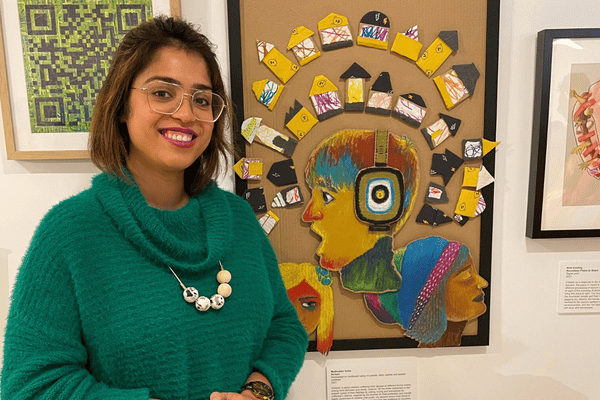Melbourne-based artist Madhubani Dutta created ‘We are the lifeless’, a digital art collection, to express how ordinary household objects helped her appreciate life during lockdown.
Like many others, the artist spent many weeks indoors at her Melbourne home. But amongst her close ones, she began to see patterns in mental health – friends feeling isolated, feeling imprisoned, feeling hopeless.
“I am grateful that I had my toddler running around, keeping me busy. I was frustrated at times but wanted to inject in people’s mind that they don’t have to feel like they’re stuck in a jail,” she told Indian Link.
Her optimistic mindset in a world experiencing a mental health crisis was the start of her ‘We are the Lifeless’.
Dutta applied to the Multicultural Arts Victoria (MAV) ‘Ahead of the Curve’ program which aims to provide a platform for young and emerging artists of colour in Melbourne. The theme of the program was to challenge stereotypical narratives of culturally and linguistically diverse (CALD) people as helpless and subordinated in society and required applicants to create a digital artwork in conversation with social issues.
“You’re still in a home, you still have so many things to comfort you. Look around and see all the things around your house which constantly tries to speak to you, asks you to take care of them,” she elaborated.
“I’m saying ‘them’ because I feel everything has a life.”
Dutta began to look around her house for objects that resonated with this deep sense of appreciation and nostalgia – her son’s favourite toy, her makeup that she hadn’t worn for a while, a statue of Abhaya Mudra, a decorated wooden spoon, a Mother’s Day bookmark. It was a time capsule of memories and dreams, a rejection of lamenting what life had become during the pandemic.
After conversations with fellow artists and people struggling with their mental health during lockdown, her project began to form shape.
She wandered around her home and started to accumulate items that resonated with her message, then she contemplated through the possibilities of categorisation and landed on colour palettes and four thematic phrases: ‘Abhaya Mudra’, ‘Fika’, ‘Kaizen’, ‘Merak’.
‘We are the Lifeless’ by emerging digital photographer and visual arts creative, Madhubani Dutta, captures the simple pleasures and findings in life that can restore mindfulness and harmony. #AheadoftheCurveCommissions https://t.co/MgVlazLm8n pic.twitter.com/DQYsOy07jI
— MAV (@MAVArtsAU) August 19, 2022
The final product became a reminder that, during hardships, there can always be a beacon of hope amidst mundanity if you are in tune with the lively atmosphere around us.
For Dutta, her artistic view of the world goes back to her childhood, growing up with a fine artist mother and a graphic and commercial artist father who versed her on contemporary and Indian folk art.
“As a family, wherever we used to go, we used to find art, be it nature, a place we travelled to, a monument. It’s how we interpreted everything,” she reflected.
Despite this background, when she first moved to Australia in 2012, she found herself unfamiliar with the inner workings of how to be a working artist or what the nation’s art scene was like.
Paving the way for her own career, she met a fellow artist from Kolkata who quit her job and started a business in arts, where Dutta realised ‘this is what I’m made for’.
“I grew up with a lot of contemporary art because that’s what my mother did a lot of, but it’s still quite different from what this country loves and wants to see the artists producing.”
She entered the industry as a local art teacher in the suburbs of western Melbourne and has been in the field ever since.
One of her mentors in the Wundergym program, an Indigenous Australian artist Kait James, taught her a valuable lesson- that art can be a language and create a movement.
This placed yet another layer of complexity in Dutta’s artmaking: ‘art activism’, which she hopes will provoke the audience to think more about social causes.
“[Art activism] is something I never explored before. And there are so many things that come up in my mind that I think the world should know about.”
She is currently holding an artist’s residency with the Wyndham City Council and working on a project based on Ratha Yatra, the chariot festival of India which saw over one million participants this year alone.
“I’m trying to bring out the essence of charity festival, which I feel not many Australians or Indian Australians or people from any other culture know about.”
READ ALSO: Exploring Picasso’s works through time at the NGV





